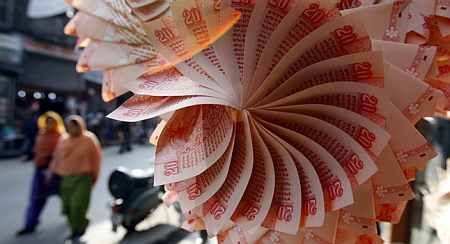
The buzz in the market is that the seventh Pay Commission recommendations will spell a goodbye to fiscal rectitude.
We, however, believe this is a false negative and our estimates buttress the contention that financial year 2017 budgeted fiscal deficit numbers at 3.5 per cent is actually going to be undershot!
This is one of the four common pay commission myths that we will explore in this article.
Myth 1: Fiscal numbers will go awry
No it would not.
Even if we assume a nominal GDP (gross domestic product) growth at 11.5 per cent (as suggested by the Pay Commission) for FY17, the incremental revenue gain is around Rs 80,000 crore (Rs 800 billion), nearly offsetting the Rs 1,02,100-crore (Rs 10.21-billion) fiscal impact.
One should remember, the impact of major incentives given to the corporate sector, including tax holidays and accelerated depreciation, in the current financial year is more than Rs 62,000 crore (Rs 620 billion), that are likely to be abolished going forward. In a similar vein, service taxes will increase to 16 per cent as a part of Goods and Services Tax next year.
Also, with global oil prices expected to stay at current levels and assuming that the government goes the full circle with subsidy rationalisation, our deficit numbers comes at 3.48 per cent for FY17!
This number is likely to have a downward bias, as our tax assumptions are mostly conservative as it is lower than the five-year incremental average.
Myth 2: Fiscal deficit will go up after FY16
The next logical question is after every Pay Commission implementation, does the fiscal deficit go up?
Historical trends suggest otherwise and the impact on the fiscal deficit is contextual. If the recommendations coincides with a global crisis, as in fourth and sixth, it goes up, primarily because of increase in consumer risk aversion due to uncertainty over business. However, during the third and fourth, fiscal deficit actually declined.
Myth 3: Capital expenditure will get compressed
Incorrect. The years subsequent to the submission of the fifth and sixth Pay Commissions witnessed a significant jump in Plan Capital Expenditure.
Plan Capital Expenditure increased at a whopping 26 per cent in 1996-97 (contraction of 9.2 per cent in 1995-96).
Similarly, during the sixth Pay Commission rate of growth doubled to 28 per cent in 2008-09 (14.8 per cent in 2007-08).
Myth 4: Consumption will get a boost
The general perception is that the increase in salaries after the implementation of the pay commission reports is translated into higher consumption expenditure.
No doubt consumption increases with increase in income, nonetheless, our study indicates that higher income on account of Pay Commission translates more into higher household savings than consumption. In particular, household financial savings increase significantly via an increase in bank deposits.
Also, impact on inflation is observed to be temporary rather than more pervasive.
To sum up, sectors like cement, iron and steel, tyres, and consumer durables will enjoy the fruits of this report, for sure.
The image is used for representational purpose only
Soumya Kanti Ghosh is chief economic advisor, State Bank of India. These views are his own












 © 2025
© 2025